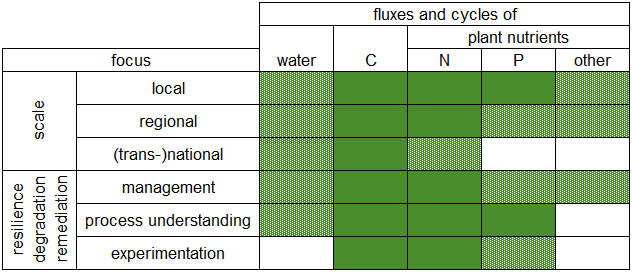Programme
Programme structure and mobility
IMSOGLO is a 2-year Master of Science programme containing 120 ECTS credits and leading to the joint diploma of International Master in Science in Soils and Global Change. IMSOGLO is organized by four European universities and involves mobility between these partner universities.
The language of instruction is English.
IMSOGLO students jointly follow the 1st semester at Ghent University to obtain and supplement their fundamental soil science knowledge. The 1st semester is kicked off by the 1-week joint Primer Event during which students are introduced to the programme, and get to know each other and staff members of all four partner universities.
The remaining semesters are spent either at Ghent University (Belgium) and Aarhus University (Denmark) for the specialization Soil Ecosystem Services and Global Change, or at BOKU University (Austria) and the University of Göttingen (Germany) for the specialization Soil-Plant System Processes and Global Change. The 2nd and 3rd semester consist of mandatory and elective courses, deepening the students’ knowledge and skills in the chosen specialization, and broadening the students’ knowledge and skills. Soft skill courses and internship are among the offered electives.
Students from both specializations will meet again during the Summer School between the 1st and 2nd year. The 4th semester will be devoted to the master thesis. All IMSOGLO theses are supervised by supervisors of at least two partner universities.
Specializations
From the 2nd semester onwards, IMSOGLO includes two elective specializations.
The specialization Soil-Plant System Processes and Global Change is organized by Ghent University (Belgium), BOKU University (Austria) and the University of Göttingen (Germany) and leads to a joint master diploma issued by these three universities.
This specialization focuses on the interactions between soils, plants, microbes and management in a changing world. There is a strong emphasis on biogeochemical processes in managed and natural ecosystems across different climates, to understand the feedbacks between land management, environmental impacts and global change.
Keywords: soil-plant interactions; biogeochemistry; microbiology; agroforestry; agro-ecology
Flavour heat map:

The specialization Soil Ecosystem Services and Global Change is organized by Ghent University (Belgium) and Aarhus University (Denmark), and leads to a joint master diploma issued by these two universities.
This specialization focuses on optimizing soil management, prevention and remediation of soil degradation, and land evaluation for land functioning in an ecosystem services context. Also, soil processes and how to describe them from a point scale to larger scale are covered.
Keywords: soil degradation; soil protection; soil restoration; ecosystem functioning; soil-water cycle; C cycle; element fluxes; soil mapping
Flavour heat map:

The specialization Soil-Plant System Processes and Global Change is organized by Ghent University (Belgium), BOKU University (Austria) and the University of Göttingen (Germany) and leads to a joint master diploma issued by these three universities.
This specialization focuses on the interactions between soils, plants, microbes and management in a changing world. There is a strong emphasis on biogeochemical processes in managed and natural ecosystems across different climates, to understand the feedbacks between land management, environmental impacts and global change.
Keywords: soil-plant interactions; biogeochemistry; microbiology; agroforestry; agro-ecology
Flavour heat map:


Programme learning outcomes
IMSOGLO graduates have the knowledge and skills to characterize soils and understand soil evolution in an ecosystem context under global change because they understand the underlying processes and interactions.
IMSOGLO graduates will be able to
- demonstrate a broad knowledge at an advanced level in basic disciplines: soil physics, soil biology, soil chemistry, land information systems
- explain the evolution of soil (agro-/forest/natural) ecosystems under natural conditions and human-impact, in relation to global change
- characterise soil, assess soil quality, and relate it to natural and anthropogenic factors
- conduct field work (soil survey, soil profile description, soil sampling), interpret analytical data, classify the soil, and manage and interpret existing geospatial (soil) data
- plan and execute target orientated experiments or simulations independently and critically evaluate the collected data
- demonstrate a holistic understanding of the interactions and processes in the agro-ecosystem and natural ecosystems, using statistical tools and advanced (geospatial) information- and modelling techniques
- act from a researchers’ perspective using creativity, accuracy, critical reflection, curiosity, and justifying choices based on scientific criteria
- integrate and extend acquired knowledge towards innovative solutions, knowing the limits of own competences
- develop and implement scientifically-sound field and lab experimental procedures to test research hypotheses
- participate in and lead interdisciplinary groups for development of sustainable environmental solutions at local, regional and global scale
- possess qualifications for employment in private and public-sector companies and organisations where high level expertise in soil management is required
- communicate, orally and written, in words and in graphs, on the own discipline to experts and the general public
IMSOGLO graduates who followed the specialization Soil Ecosystem Services will additionally be able to
- describe and model the soil water cycle and its relation to soil degradation and soil management
- design soil water management strategies under a changing climate
- recognise soil threats and identify promising ecosystem services for a field situation
- measure and model erosion risk, soil compaction and the other soil threats identified by the EU
- characterise the relation between the C-cycle and the climate at different scales
- utilize various advanced soil mapping technologies and methods to create detailed and accurate spatial representations of soil properties
IMSOGLO graduates who followed the specialization Soil-Plant System Processes will additionally be able to
- sample, measure and describe concepts of biogeochemistry, in particular pools and and fluxes of carbon, nitrogen and water in (agro-) ecosystems
- analyse and describe the impact of soil properties and processes on plant nutrition and health
- explain and describe the global role of soils and soil microorganisms, in the exchange of greenhouse gases with the atmosphere
- evaluate the impact of land management on soils and on the environment in different regions of the world
- apply stable isotopes in the context of biogeochemical research
- explain the role of soil microbiology for soil functions, with a special emphasis on plant nutrition
Detailed programme overview
Soil Fundamentals
| Type | Course | Lecturer | Credits (ECTS) |
|---|---|---|---|
| Mandatory | Soil Biology | Junwei Hu | 4 |
| Mandatory | Soil Chemistry | Filip Tack | 5 |
| Mandatory | Soil Physics | Wim Cornelis | 5 |
| Mandatory | Land Information Systems | Frieke Vancoillie | 5 |
| Mandatory | Soil Evolution under Global Change | Marijn Bauters | 6 |
| Mandatory | Applied Statistics | Louis Coussement | 5 |
Year 1, semester 1
| Type | Course | Lecturer | Credits (ECTS) |
|---|---|---|---|
| Mandatory | Soil Biology | Junwei Hu | 4 |
| Mandatory | Soil Chemistry | Filip Tack | 5 |
| Mandatory | Soil Physics | Wim Cornelis | 5 |
| Mandatory | Land Information Systems | Frieke Vancoillie | 5 |
| Mandatory | Soil Evolution under Global Change | Marijn Bauters | 6 |
| Mandatory | Applied Statistics | Louis Coussement | 5 |
Depending on the chosen specialization
| Type | Course | Lecturer | Credits (ECTS) |
|---|---|---|---|
| Mandatory | Climate Change | Dirk Verschuren | 4 |
| Mandatory | Soil Water Management | Wim Cornelis | 5 |
| Mandatory | Soil Degradation | Ann Verdoodt | 5 |
| Mandatory | Living Lab Summer School in Soils and Global Change | Marijn Bauters | 3 |
| Elective courses (choose 13 ECTS credits) | |||
| Elective | Land Evaluation | Ann Verdoodt | 5 |
| Elective | Economics and Management of Natural Resources | Stijn Speelman | 4 |
| Elective | Precision Agriculture | Abdul Mouazen | 5 |
| Elective | Dare to Venture | Johan Verrue | 4 |
| Elective | Scientific Communication in English | Geert Jacobs | 5 |
| Elective | Introduction to Data Science | Jan Verwaeren | 4 |
| Elective | Internship | Steven Sleutel | 5 |
| Elective | Open choice | 5 | |
Year 1, semester 2
| Type | Course | Lecturer | Credits (ECTS) |
|---|---|---|---|
| Mandatory | Climate Change | Dirk Verschuren | 4 |
| Mandatory | Soil Water Management | Wim Cornelis | 5 |
| Mandatory | Soil Degradation | Ann Verdoodt | 5 |
| Mandatory | Living Lab Summer School in Soils and Global Change | Marijn Bauters | 3 |
| Elective courses (choose 13 ECTS credits) | |||
| Elective | Land Evaluation | Ann Verdoodt | 5 |
| Elective | Economics and Management of Natural Resources | Stijn Speelman | 4 |
| Elective | Precision Agriculture | Abdul Mouazen | 5 |
| Elective | Dare to Venture | Johan Verrue | 4 |
| Elective | Scientific Communication in English | Geert Jacobs | 5 |
| Elective | Introduction to Data Science | Jan Verwaeren | 4 |
| Elective | Internship | Steven Sleutel | 5 |
| Elective | Open choice | 5 | |
| Type | Course | Lecturer | Credits (ECTS) |
|---|---|---|---|
| Mandatory | Landscape Ecology | Daniela Sauer | 6 |
| Mandatory | Management of Tropical Plant Production Systems | Reimund Rötter | 6 |
| Mandatory | Mineral Nutrition of Crops under Different Climate and Environmental Conditions | Klaus Dittert | 6 |
| Elective courses (pick two for 12 ECTS) | |||
| Elective | Soil Biogeochemistry of Agricultural and Forest Ecosystems | Martin Maier | 6 |
| Elective | Crop Modelling for Risk Management | Reimund Rötter | 6 |
| Elective | Plant Nutrition and Plant Health | Klaus Dittert | 3 |
| Elective | Earth Surface Dynamics and Associated Hazards | Elisabeth Dietze | 6 |
| Elective | Procedures of Resource Analysis and Evaluation | Elisabeth Dietze | 6 |
| Elective | Science Communication in Biodiversity Research | Maria Teresa Aguado | 6 |
| Elective | Biological Control and Biodiversity | Michael Georg Rostás | 6 |
| Elective | Field Course on Human-Environment Interactions | Daniela Sauer | 6 |
| Elective | Open choice | 6 | |
| Type | Course | Lecturer | Credits (ECTS) |
|---|---|---|---|
| Mandatory | Assessing Soil Erosion Risk | Goswin Heckrath | 5 |
| Mandatory | Applied Soil Physics | Bo V. Iversen | 10 |
| Mandatory | Digital Soil Mapping and Soil Sensors | Mogens Humlekrog Greve | 5 |
| Elective courses (Choose 10 ECTS) | |||
| Elective | Carbon Cycling and Climate Change | Mathias Neumann Andersen | 10 |
| Elective | Climate Through Earth’s History | Marit-Solveig Seidenkrantz | 5 |
| Elective | Soil Classification | Mogens H. Greve | 5 |
| Elective | Arctic Soils | Mogens H. Greve | 5 |
| Elective | Open Project Work on Soil Threats and Ecosystem Services | 5 | |
| Elective | Open choice | 5 |
Year 2, semester 3
| Type | Course | Lecturer | Credits (ECTS) |
|---|---|---|---|
| Mandatory | Landscape Ecology | Daniela Sauer | 6 |
| Mandatory | Management of Tropical Plant Production Systems | Reimund Rötter | 6 |
| Mandatory | Mineral Nutrition of Crops under Different Climate and Environmental Conditions | Klaus Dittert | 6 |
| Elective courses (pick two for 12 ECTS) | |||
| Elective | Soil Biogeochemistry of Agricultural and Forest Ecosystems | Martin Maier | 6 |
| Elective | Crop Modelling for Risk Management | Reimund Rötter | 6 |
| Elective | Plant Nutrition and Plant Health | Klaus Dittert | 3 |
| Elective | Earth Surface Dynamics and Associated Hazards | Elisabeth Dietze | 6 |
| Elective | Procedures of Resource Analysis and Evaluation | Elisabeth Dietze | 6 |
| Elective | Science Communication in Biodiversity Research | Maria Teresa Aguado | 6 |
| Elective | Biological Control and Biodiversity | Michael Georg Rostás | 6 |
| Elective | Field Course on Human-Environment Interactions | Daniela Sauer | 6 |
| Elective | Open choice | 6 | |
| Type | Course | Lecturer | Credits (ECTS) |
|---|---|---|---|
| Mandatory | Assessing Soil Erosion Risk | Goswin Heckrath | 5 |
| Mandatory | Applied Soil Physics | Bo V. Iversen | 10 |
| Mandatory | Digital Soil Mapping and Soil Sensors | Mogens Humlekrog Greve | 5 |
| Elective courses (Choose 10 ECTS) | |||
| Elective | Carbon Cycling and Climate Change | Mathias Neumann Andersen | 10 |
| Elective | Climate Through Earth’s History | Marit-Solveig Seidenkrantz | 5 |
| Elective | Soil Classification | Mogens H. Greve | 5 |
| Elective | Arctic Soils | Mogens H. Greve | 5 |
| Elective | Open Project Work on Soil Threats and Ecosystem Services | 5 | |
| Elective | Open choice | 5 |
| Type | Course | Institution | Credits (ECTS) |
|---|---|---|---|
| Mandatory | Master thesis | BOKU University | 30 |
| or | |||
| Mandatory | Master thesis | University of Göttingen | 30 |
| Type | Course | Institution | Credits (ECTS) |
|---|---|---|---|
| Mandatory | Master thesis | Ghent University | 30 |
| or | |||
| Mandatory | Master thesis | Aarhus University | 30 |
Year 2, semester 4
| Type | Course | Institution | Credits (ECTS) |
|---|---|---|---|
| Mandatory | Master thesis | BOKU University | 30 |
| or | |||
| Mandatory | Master thesis | University of Göttingen | 30 |
| Type | Course | Institution | Credits (ECTS) |
|---|---|---|---|
| Mandatory | Master thesis | Ghent University | 30 |
| or | |||
| Mandatory | Master thesis | Aarhus University | 30 |





